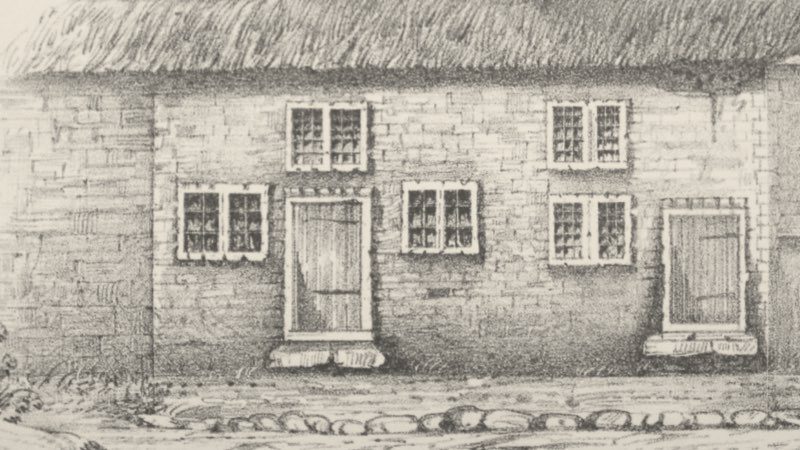
The Life And Testimony Of Mary Ann Topp
Gospel Standard 1868:
Death. Suddenly, on April 1st, 1867, at Market Lavington, my dear wife, Mary Ann Topp, in her 48th year. She was a member of the church at Lavington.
The Lord was pleased to convince her of her lost estate many years ago, and laid the weight and power of eternal things upon her conscience in the days of her youth; and though she tried to banish all thoughts of God and eternity, by getting into company with her young acquaintances and going to many places of amusement, still the solemn realities of an eternal state would follow her; so that she often retired in secret and bent her knees before the Lord and wept over her sins. She also began to feel a great desire to read her Bible, and the Lord often shined upon it, so that she felt it dearer unto her than thousands of gold and silver. There were no ministers near her who seemed to come into her path; but as the dear Lord led her along in the path of life, he opened up to her more of the suitability of Christ, and she saw Him as the only way whereby mercy could come to save her lost and perishing soul.
About this time, the ordinance of believers’ baptism was much laid upon her mind. She saw it to be the right way into the visible church, and felt a longing desire to cast in her lot with the people. Her love to Christ outweighed her love for father, mother, friends, and relations. She felt she could leave all for Christ’s sake, and though, at this time, she was on the point of marriage with a young man for whom she had a very close affection, yet she said to him, “If you leave me, I cannot help it, I must follow that precious Christ who has laid down his life to redeem my soul.” When she came before the church, the deacon said to her, “Can you leave all for Christ’s sake?” She answered, “Yes,” and in 1841 she was baptized at Warminster and joined the Baptist church there, where she had for some time attended. The young man finally parted from her. She felt this a very keen trial, yet never regretted the step she took in obeying the command of her Lord; but it was sanctified for her spiritual good and the glory of God; for it wrought in her soul more earnest longings and pantings after more communion with Christ and his great salvation; and the Lord often shined upon her pathway and blest her with some special marks of his everlasting love, which, at times, killed her to all things here below; and though she had several offers of marriage afterwards by respectable persons, yet she refused them all, till the set time came.
She now became sick of the preaching where she attended; nor, indeed, could she find any discriminating truths preached in the town, but was led, by the providential hand of the Lord, to this little town, and was privileged to hear that servant of Christ, the late Mr. Dark, whose ministry was expressly blest to her soul; for the Lord led him so sweetly into her pathway that she could say with Ruth, “Entreat me not to leave thee,” &c. She felt a great union also with the children of God at Lavington, so that she had often gone in secret and begged the Lord he would, in his Providence, so order that she might live near or spend her days with them. The Lord heard the voice of her supplication and opened a way for her to live with a family as governess at a farm near, and she felt it good on the Lord’s day to come to hear; and often did she return home with her soul refreshed.
But after a time, she left her situation, and went to live at Bath. During her stay there, she was much blessed in reading the experience and death of my dear departed mother, Elizabeth Topp, in the Sept., Oct., and Nov. numbers of the “Gospel Standard” for 1854. She perused it over and over, and found it as bread cast upon the waters, found after many days. She met with the account in the “Gospel Standard,” May and June, 1856, of the death of my sister, Mary Jane Ellis. This was made very profitable to her, as it was the means of breaking a snare that Satan was laying for her feet. A man, a professor of religion, and preacher too, was trying to get her feet into the marriage net, and take her to America, and she felt half inclined to yield; but reading the awful deception that my sister met with so preyed upon her mind, and the word would follow her, “Let this be a fearful warning to all God-fearing, unmarried females,” that she felt constrained to give him up, and she was enabled to bless the Lord that the snare was broken, and she begged the Lord that she might be kept from all the flattery of young men that might come with a garb of religion.
In 1859 we were married. She was a God-fearing soul, with a tender conscience, and her desire was to live becoming the gospel of Christ. It was her delight to receive the Lord’s servants on the Sabbath; but often she returned home in the evening grieved that she had felt so little under the preaching.
She was a praying soul, and many times did the dear Lord give her marked answers to her cries.
On Dec. 16th, 1863, she passed through a heavy trial, through the death of her father, who died without leaving the shadow of a good hope. She was with him in his last moments, and said to him, “Father, you are a dying man. What is your hope beyond the grave! You must be born again, or you never can enter the kingdom of heaven.” He answered, “Ah! my child! Don’t you vex about me. I am all right. I was born again when I was baptized in the Church of England.” She replied, “O, father! That is an awful error!” and said many solemn things to him; but her words made not the least impression upon him. He shortly afterwards breathed his last.
The death of her father took a lasting effect upon my wife, and changed the appearance of her countenance. She never fully overcame it, and would often burst into tears and weep bitterly, and say, “O my poor father! To think that you are lost!” &c. After a time, she was enabled to bow down more to the sovereignty of the Lord.
She spent a most blessed day at the Calne anniversary about four years ago. She did not lose the savour of it for months afterwards; but during her last days she seemed to have gathered but very little under the word. She often mourned over her barrenness and leanness, and the death in Zion.
The evening before her death, she came on the road with my little boy to meet me on my return from Uphavon, and was pleased to tell me that the Lord had appeared for my sister’s son in his last moments, and that he died in the morning, little thinking that the next evening she would be called to pass the same gloomy valley. During the Monday she was as well in body as she had been for some time, and quite cheerful all the day. In the afternoon, at the tea table, she was reading the “Gospel Standard” nearly all the time. The Obituary of Richard Healy, in the April No., was particularly sweet to her; and she remarked to me at the table, “How sweet are these letters, Joseph!” desiring me to take the “Standard,” to read them, she seemed so lifted up in her feeling, and talked so freely to all around her, while following her daily calling up to her last moment.
A little before 7 o’clock the same evening, she having gone out, my little boy came in crying, and said, “Father, mamma has fallen down, and can’t get up.” I immediately opened the door; and there she lay, a lifeless corpse. Her immortal soul had departed.
Thus has the Lord taken away my second partner in life, and left her bereaved husband to mourn her loss, which is her eternal gain.
Joseph Topp
Market-Lavington, Dec. 3rd, 1867.
Mary Topp (1819-1867) was a Strict and Particular Baptist believer. She was the second wife of Joseph Topp, a God-fearing man whose intimate knowledge of the brethren allowed him to contribute several biographical sketches of departed saints to the “Gospel Standard”.



